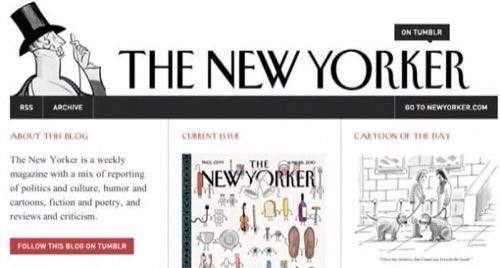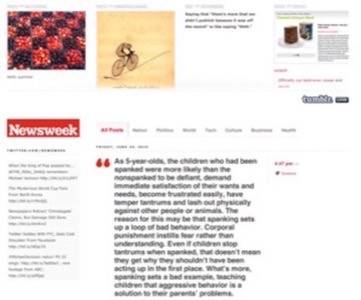Traditional media’s first major adoption of Web 2.0 came with Facebook, as outlets syndicated their content on the popular social network by way of fan pages and official accounts. Then, Twitter went mainstream as writers, editors and the media organizations themselves signed up, sent out links, and chatted about related topics in 140 character bursts. Now it seems traditional media outlets are flocking to another service – one that is almost a hybrid of the others, allowing for short-form posts, but with richer format.

What’s the new trend among legacy media? Why it’s none other than Tumblr.
For those unfamiliar with the service, Tumblr is a blogging platform that lets users curate images, videos, quotes, and other forms of media onto minimalistic personalized “tumblelogs.” Much like Twitter, there is a one-way follow function that lets users view a stream of entries from others of their choice. The quick ability to comment, favorite and “reblog” others posts makes the service incredibly social.

As noted in a Business Insider article Friday, several outlets of traditional print media (newspapers and magazines) are suddenly popping up all over Tumblr with their own pages. Newsweek seems to making great use of the platform by posting mainly photos, and quotes – two of the most shared forms of media on Tumblr. The New Yorker also recently joined the service, sharing mainly videos and photos, including high-resolution images of their popular artistic covers.
The venerable New York Times has even jumped in the mix, though its account is so far empty, save for a single post announcing more content is “coming soon.” The Business Insider article lists several other traditional media outlets providing sharable content with fans on Tumblr, including Life Magazine, The Travel Channel, The Today Show, Elle, Rolling Stone, The Village Voice, and several others.

If anything, these new additions to the Tumblr ecosystem provide a human face through which the various outlets can communicate more freely with their readers. Newsweek has been discussing rumors about its impending purchase on the Tumblr, and many of the sites seem perfectly content with posting material would think would be found objectionable on the main homepage or in print.
So is Tumblr the next big thing for traditional media outlets? From the looks of it, the large media outlets seem pleased with the service and the kinds of interactions it allows for. It would not be surprising to see Tumblr become the third common place aside Facebook and Twitter for media organizations and corporate brands to further reach their audiences.

















